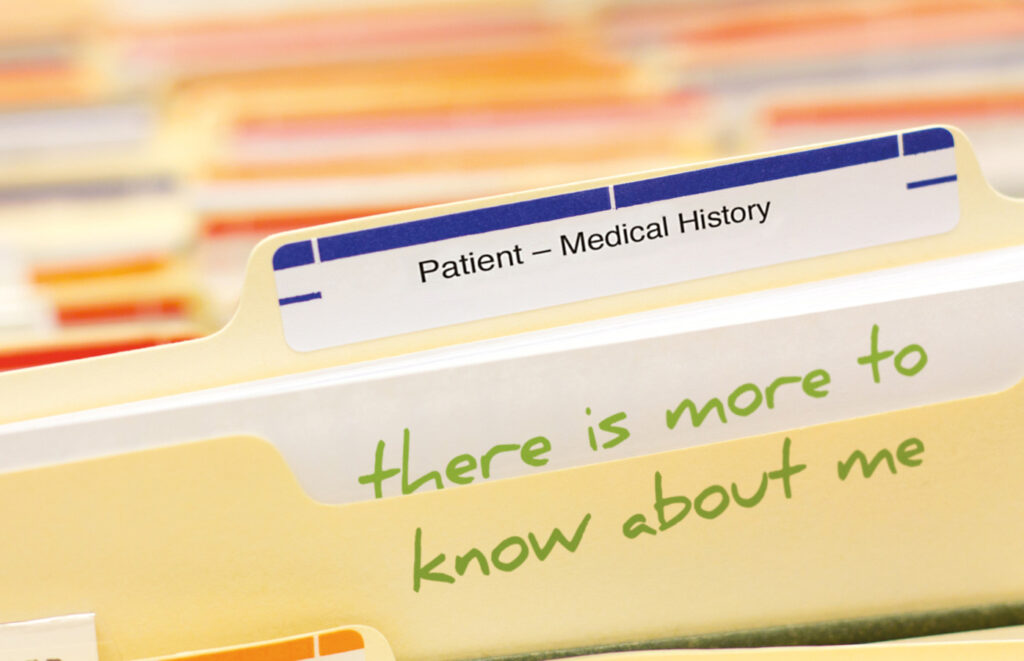Maeve’s story
“I cannot begin to express how this diagnosis has harmed me. It has led to trauma that impacts me daily.”
Content warnings: self harm, references to suicide

Receiving a diagnosis of EUPD has added significantly to my traumas. I have too many negative experiences to fit into this space. I wasn’t told when my diagnosis was changed to EUPD, but it was clear that it impacted every part of my treatment. Over time, as my struggles with self-harm and [attempts to end my life] worsened, I was treated less like a human being in pain and more like a set of manipulative behaviours.
The nurses complained about me being ‘just another case of EUPD.
[After attempting to end my life] I was left in a bay where a doctor came and asked me my diagnosis. I then had to listen whilst he and the nurses in the nurse’s station complained about me being ‘just another case of EUPD’.
Later on, my partner became concerned that I wasn’t being monitored. When she asked a doctor for help and told him what [had happened], he shrugged. I was then assessed whilst semi- conscious by a psychiatrist who told me to ‘sit up whilst I talk to you’. Later down the line, I was given a care coordinator who it was clear had many preconceptions about me based on this diagnosis. When she felt I was becoming too attached , despite knowing about my difficulties with previous relationships, she cut off the relationship and told me if I was in crisis to call the duty number , not her.
When I called whilst suicidal, the attitude of the duty person towards me changed dramatically once I said my name. ‘You’ve tried this on (care coordinator)’ she said, ‘it won’t work on me’ (in reference to my wish to [end my life.]). As I explained how distressed her response was making me she said that she couldn’t stop me [attempting to end my life] so she was going to put the phone down. When I expressed my shock at the treatment I was receiving and said I felt it felt punitive she said ‘we will all disagree with you’.
I was told ‘patients like me’ enjoy being inpatients.
She then told me crying would get me no where with her and proceeded to put the phone down. When I made a formal complaint I met with the head of the team who explained that informed by DBT, the team do not talk to people who are expressing an active wish to kill themselves.
I was repeatedly refused hospital admission whilst severely unwell and was told this was because ‘’patients like me’ enjoy being inpatient. I feel that preventing dependence was prioritised over my safety. Later on after another [attempt], I was greeted on waking by a crisis team nurse at my bedside. She proceeded to reprimand me, telling me ‘this won’t get you help any quicker’. She then told my parents who came to the hospital on hearing what had happened, that they shouldn’t have ‘run to my rescue’, implying that the more attention they paid me, the worse I would get.
Years of being invalidated, reprimanded and even tainted my mental health professionals.
I was eventually given a year of DBT therapy which I experienced as victim blaming and gaslighting. I was informed that I could use a telephone service for support but that it would be cut off for 72 hours if I self-harmed – needless to say, I never called. During this time, with social support and medication, my depression began to lift and I entered a more stable period. I noticed that suddenly the DBT therapists were being very kind and responsive and behaving in a way I had never experienced when in crisis. I realised that I was being rewarded with compassion for my ‘good behaviour’. This made no sense to me as all that was happening was that I was feeling better (and this was in no way due to them or DBT).
After years of being repeatedly invalidated, reprimanded and even tainted by mental health professionals, (I have shared only a few experiences – there are many more!), I vowed that i would never enter MH services again. Despite staying as far away as possible, the EUPD diagnosis continues to loom over me. It has impacted on me being able to access the medication I need for my anxiety from the GP . I am also convinced It has led GPs to doubt my symptoms.
I cannot begin to express how this diagnosis has harmed me. It has led to trauma that impacts me daily.
Speak your truth: your own experiences can help create change
If you want to share your experiences around this diagnosis you can take part in Platfform’s Truth Project.
Platfform are campaigning for a review of the use of the diagnosis of PD. Add your voice to our call for change by sharing your story. We will share these with Welsh Government and use them to strengthen our campaign.
For more information, and to access the survey, click here.
If you are in a mental health crisis, please read this paragraph
If you have been affected by anything in this story and would like to talk to someone you can call Samaritans on 116 123. You can also call the national mental health support line for advice on 111 (press 2.)


